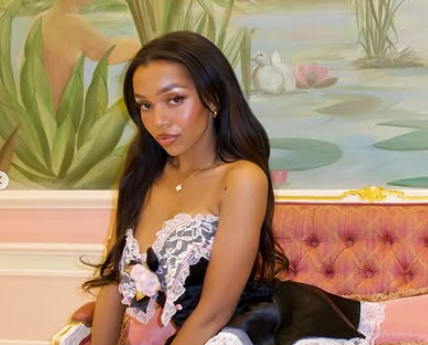Daphne Blunt’s childhood tales unfold like contemporary fairy tales tinged with surrealism, as she was raised free from the weight of financial uncertainty. She is more than just a viral influencer; she is a striking illustration of how privilege can profoundly alter perception in novel ways. Instead of establishing empires or moving up the corporate ladder, Daphne’s parents chose to forego traditional employment. She assertively points out that her mother never worked. Before she turned five, her father retired. That fact alone, presented in such a casual manner, provides a strikingly powerful explanation for why Daphne never fully understood what a 9-to-5 was.

Daphne was being pulled out of class to attend high-stakes horse races during those early years, while the majority of kids were busy learning about responsibility through chores and schedules. In the middle of the day, her father would take her shopping for racehorses, clearly not caring about her attendance at school. She proudly held the title of youngest licensed racehorse owner in her state at the age of nine. Instead of throwing a traditional party to celebrate her birthday that year, her father named a race after her. These were real childhood recollections. She subsequently provided pictures of herself in the winner’s circle as evidence, which, despite their straightforward appearance, were remarkably obvious in their meaning.
Daphne Blunt Profile
| Full Name | Daphne Louise Blunt |
|---|---|
| Birth Year | 1997 |
| Nationality | American |
| Profession | Actress, Writer, Influencer |
| TikTok Followers | Over 96,000 |
| Viral Claims | No jobs in family, racehorse ownership, UK travel without passport |
| Family Status | Parents retired early, financially secure |
| Known Events | White House visits, racehorse named after her |
| Reference |
That type of upbringing, which is particularly impacted by wealth and adaptability, is uncommon and socially appealing. Public interest in “nepo babies” has skyrocketed in recent years, but Daphne stands out in a particularly creative way. Instead of making headlines or running studios, her family operated with amazing secrecy and, in her words, unheard-of access to prestigious places. She stated in a widely shared video that she did not have a valid passport when she visited the UK as a toddler.
She claims that following a few phone conversations, her family was given permission to enter the country regardless, straight from Queen Elizabeth’s office. This detail sounded unbelievable to skeptics. Nevertheless, she followed up with a picture of a temporary passport that the U.S. Embassy in London had provided—clear proof that something exceptionally diplomatic had happened.
Daphne’s unique access to American political arenas further set her upbringing apart. She shared documented invitations from White House events, which she attended with remarkable regularity. She was seen in one picture standing behind the Attorney General’s podium, which is normally closed to the general public. This wasn’t a brief moment of celebrity; rather, it was a way of life built on institutional access, inherited legitimacy, and incredibly high-ranking family ties.
Daphne isn’t merely narrating personal tales by making these stories publicly available, particularly on sites like TikTok; rather, she’s quietly changing the way privilege is expressed. Even though her content describes a life that most people can hardly imagine, her style is playful, frequently humorous, and surprisingly relatable. For example, she acknowledged that because her family always bought homes outright, she had never understood what a mortgage was. The idea of financing real estate still baffles her as an adult. Even though that statement seems absurd, it also emphasizes how drastically different classes’ financial experiences are.
She is successfully turning social media into a platform for open and honest wealth storytelling with her videos. However, Daphne contextualizes her experiences with thoughtful honesty, in contrast to many influencers who display their lifestyles without providing an explanation. She is more interested in documenting than impressing. Despite her occasional playfulness, her tone frequently finds a balance between acceptance and awe. Because of this, she is a very adaptable online personality who can interact without offending people and amuse without being condescending.
Her content’s virality was probably aided by its sincerity and clarity. Comments on her videos are funny, awe-inspiring, and sometimes jealous. In jest, one viewer offered to trade lives for a week in order to experience her privilege. While praising Daphne for taking responsibility for her story, another acknowledged that she inherited “debt and mental illness.” The difference between the normal and the Daphne-normal has become a constant source of interest.
Her parents are still mysterious in many respects. They are not famous, even though they played a major part in giving their daughter such a unique life. The public does not know their names, their occupations (or lack thereof), or their sources of funding. Given the current era of excessive exposure, that anonymity is particularly alluring. It preserves the mystery surrounding the family and asks viewers to speculate about the kind of wealth—or connections—that might make that kind of life possible. From this perspective, Daphne’s story reads more like a contemporary parable about social elasticity and inherited access than it does like a biography.
Daphne carved out a path through talent and perseverance, even though her life was shaped by extraordinary privileges. By the time she was two, she was performing in community theater, in addition to taking acting, dance, and vocal classes. Her motivation came from an intrinsic desire to perform rather than from a need. Having no family history in entertainment, she built her career on her own terms, starting with modeling before moving into TV and movies. In today’s creative industry, where many young talents are juggling inherited platforms with authentic skill sets, that balance between comfort and ambition feels especially pertinent.
The emergence of influencers like Daphne Blunt marks a change in a larger cultural context. The polished narratives no longer satisfy viewers. They seek contradiction, subtlety, and—possibly most crucially—evidence. All three are offered by Daphne. Her racehorse memories, podium photos, and passport photo are not merely mementos of her experiences; they are turning points in a life story that rewrites what it means to be wealthy.
She is positioning herself as an unintentional documentarian of generational wealth through her deliberate self-disclosure, in addition to being an influencer. Despite being mostly absent, her parents continue to play an intriguingly important role in the narrative. Despite being unrelatable to most, their presence of power and lack of careers created an environment that makes for an incredibly powerful setting for storytelling.
